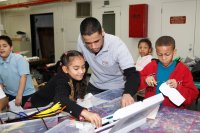Collaborating With After-School Staff for the Benefit of Students
The many opportunities for classroom teachers and after-school staff to work together create new ways to support student learning.
Your content has been saved!
Go to My Saved Content.After-school staff can play an important role in education, so it’s a good idea for teachers to find ways to work with them, Eva Jo Meyers writes in an article for Cult of Pedagogy. Meyers describes how her perspective on after-school programs evolved from annoyance to admiration.
As a teacher, Meyers was frustrated by the inconveniences created by the after-school program at her school, such as being forced out of her room at the end of the school day and finding a mess when she returned the next morning. She didn’t engage with any of the after-school staff, and it wasn’t until she became an after-school instructor herself that she realized the missed opportunities. Now she has advice for ways teachers can be more engaged with their after-school colleagues.
Share observations: Meyers encourages teachers to break down barriers. She suggests inviting after-school staff to the classroom to observe a half or full day. “This helped open up conversations about teaching strategies, behavior systems, and classroom expectations, and even led to conversations on how to support specific students, with both sides contributing ideas,” Meyers says. If a full-day observation isn’t possible, invite after-school staff to participate in the transition from the regular day to the after-school program.
Create an inclusive community: Ask after-school colleagues to attend grade-level meetings so they can plan enrichment activities that complement school-day lessons. Include after-school staff in school events such as holiday parties and classroom celebrations.
Encourage the participation of after-school staff in parent-teacher conferences. Doing so will create a more inclusive working environment, and may offer insights to parents that they might not learn otherwise. “After-school staff see another side of students, a side that isn’t always visible during the school day,” Meyers notes. If they can’t attend the conference, ask after-school staff members for written feedback or meet with them before the conferences to get their thoughts on individual students.
Engage after-school staff on student assignments: After-school staffers often find it difficult to assist students with homework assignments because students come from different classes and in some cases different schools. Another hurdle: “I have found that teachers sometimes express resistance to sharing this information, as there are concerns that after-school staff will give students the answers,” Meyers writes. “The point here is to help after-school staff more quickly note what is to be done for the homework, and sometimes seeing the correct completed assignment can make all of the difference in a staff member’s ability to lead students in the right direction.” Educators can also volunteer in the after-school program to model how to appropriately assist with homework assignments.
Share space: It seems simple, but providing after-school colleagues with some physical space for their materials can make a big difference in their work. Meyers encourages not only giving access to the space but also allowing students to continue to use the materials they use during the school day throughout the after-school period, even though it may mean items get misplaced.
